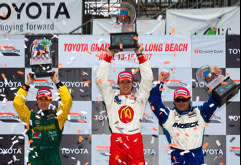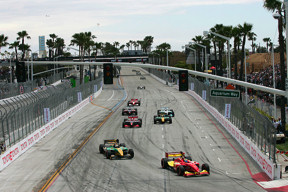The Way It Is/ Plenty of challenges remain for Champ Car
by Gordon Kirby Order was restored in Champ Car racing at Long Beach last weekend as Sebastien Bourdais dominated the race, winning convincingly from the pole. It was Bourdais's third win in a row at Long Beach, equalling a feat achieved by Al Unser Jr. between 1989-'91. Despite hopes for a different scenario with the Panoz spec car, Bourdais and Newman/Haas remain the class of the Champ Car field.
Order was restored in Champ Car racing at Long Beach last weekend as Sebastien Bourdais dominated the race, winning convincingly from the pole. It was Bourdais's third win in a row at Long Beach, equalling a feat achieved by Al Unser Jr. between 1989-'91. Despite hopes for a different scenario with the Panoz spec car, Bourdais and Newman/Haas remain the class of the Champ Car field.
Meanwhile, everyone was delighted to see Oriol Servia turn in a great performance to finish a close second. Servia drove in place of Paul Tracy who broke a vertebra in his lower back in an accident on Saturday morning and will be out of action for between two and three months. That Servia is one of Champ Car's top drivers is without question and he proved it again as he jumped into Tracy's car and got right with the program. Servia will drive for Forsythe again in Houston next weekend but with Tracy sidelined and Mario Dominguez signed for only Champ Car's first three races, the amiable Oriol may turn out to be Jerry Forsythe's best bet for this year's championship.
In the post-race press conference Bourdais was asked what he thought about Servia not having a ride this year. "It pisses me off," Bourdais responded. "I'm a good friend of Oriol. He deserves a ride and I've been trying to help all winter, but I'm not going to put a million dollars on the table to get him a ride either. A professional series should have professional drivers and when you hear people asking drivers for a million dollars for a ride, it's not right."
Las Vegas winner Will Power drove another strong race in Long Beach, eventually finishing third after outbraking Alex Tagliani on the last lap. Power ran second in the opening laps and kept the pressure on Bourdas until he had trouble finding first gear on the race's first restart and lost a place to Tagliani. But Power continues to lead the championship and looks entirely capable with Derrick Walker's Team Australia of fighting for the championship with Bourdais and Newman/Haas.

© LAT USA
But the fact remains that television ratings, national media interest and major sponsorship have vanished from both Champ Car and IRL. Despite protestations otherwise by some of Champ Car's ownership, everyone knows that rent-a-rides make up much of the field in Champ Car. Many people believe American open-wheel racing is doomed to mediocrity and marginalization and the largely vacant pressroom at Long Beach in recent years is a testament to the grand conundrum facing Champ Car's leadership.
Nor does this year's Champ Car World Series enjoy a schedule which will help attack these problems. The schedule includes a seven-week break after Houston next weekend until Portland in June. Then after Elkhart Lake in the middle of August the series runs five races outside of the country over three and a half months until the season-closer on a new downtown Phoenix street track in December. So Champ Car will be entirely off the American media map for the last third of its season. This is no way to build brand awareness or national media interest in the series.
Champ Car will run two new European races in Belgium and Holland in August and September and hopes to make its debut in China in October, but I worry that Bernie Ecclestone won't let another major open-wheel race take place anywhere in Asia anytime near the Chinese GP F1 race scheduled a few weeks earlier. But international interest in Champ Car racing continues and among the visitors to Long Beach last weekend was Salem Bin Dasmal, the former CEO of DubaiLand, a $7 billion real estate company and owner of the Dubai AutoDrome, a purpose-built race track which has staged an A1GP race.
Amid growing stories about discord and feuding between Champ Car's owners I talked to Jerry Forsythe at Long Beach about the state of Champ Car in 2007. "I've got three partners I'm very pleased to be associated with," Forsythe commented. "They all have different aspects of their professions that they bring to Champ Car. I tend to sit in the background and watch what's going on and then I'll speak out, usually to the partners rather than to the public or media, or to the employees. I believe in hiring people and letting them do their job. I don't try to micromanage any of my businesses."

© LAT USA
Forsythe pointed to the previous week's inaugural race in Las Vegas as the perfect example of Champ Car's plans for growth. "Those guys are promoters, they're in the sports business, and they understand it," Forsythe remarked. "Dale Jensen told me in Las Vegas that this was going to be the worst Las Vegas ever. He said next year is going to be much better and the following year will be better again. They did the right thing. How many people have tried to do a Las Vegas Grand Prix? They did their homework and they got tremendous support from the city.
"Did they make any money the first year? I doubt it, because you have a tremendous investment in walls and fences and infrastructure, but they have the resources and they have a five-year contract with options and Dale's going to be a great partner for us. I'm sure we're going to find other people out there who can emulate what's been done in Las Vegas and what they will do in Phoenix."
Forsythe said Long Beach remains the well-developed prototype of what a street race should be. "The Long Beach Grand Prix has been here for thirty-three years and Jim Michaelien and his people know the business," Forsythe remarked. "We encourage promoters to come and talk to Jim. He's very helpful to them. Of course, we're still rebuilding this race and I think this year is a lot better than last year. This is our premier event. This is what road racing is all about on city streets and it's also the classic example of a street race which has helped redevelop a city's downtown core."
The key to success for Champ Car of course is generating enough TV and national media coverage to sell serious sponsorship so that teams can hire the best drivers available like Servia. The goal is to have major brands start building national advertising campaigns around the drivers like we see in NASCAR, but to get there from where open-wheel racing is today, and to do it in a world where NASCAR means racing is going to be a long, tough haul.
The only way it can happen is through building on successful races like Long Beach and making them bigger and better not only in their own markets but nationally as well. The more successful the individual races and the more the focus can be on the racing and the drivers--the stars--the more the media will cover the series. It's a very simple equation but to achieve the right result will take time and a concerted effort from Champ Car.
To get there Champ Car will have to find a way to get much more television coverage and also to convince the nation's newspapers to cover the Champ Car World Series, not just those in the local race markets. Even in CART's heydays few newspapers bothered to cover the series and even fewer sent staff writers to more than a handful of races. This was a key area where NASCAR blew CART into the weeds over a long period of time. In fact, CART and IRL have driven away the media, not only because of a constant drumbeat of political rather than sporting stories but also because they tried time and again to censor or intimidate the press.
Today NASCAR enjoys a powerful nationwide press corps while Champ Car and IRL function without mainstream press corps, relying primarily on websites and a handful of small circulation enthusiast publications to get the news out. If either form of American open-wheel racing is to become a nationally-recognized and respected sport once again a revolution will have to take place in this department, but I'm not sure that the comprehension, will and commitment is there to reach this goal.
I remember well a comment made a few years ago by Rob Correa of CBS Sports to Kevin Kalkhoven and Dick Eidswick who had asked Correa what it would take for Champ Car to be able to earn rights fees for telecasts of its races. "We put on TV what's in the newspapers and Champ Car doesn't exist in the national press," Correa told them. "We never read about Champ Car in the New York Times or the Walt Street Journal or USA Today, but if you want to be a player on television you better have a profile in the major newspapers. Right now, you guys don't have any of that."
After the race in Long Beach on Sunday, I heard some more clear words about Champ Car from Craig Gore, the man behind Team Australia and Aussie Vineyards. Gore is a garrulous fellow and true Australian, unfraid to speak his mind. "I don't back away from my viewpoint of both Paul (Gentilozzi) and Dan (Pettit) not running two cars," Gore said. "They're great guys, but we need more cars on the grid. Both of them should be running two cars."
Gore has become a great champion of Champ Car and is very direct in identifying the primary source of American open-wheel racing's problems. "Tony George is single-handedly responsible for fucking open-wheel racing in this country," Gore declared. "He took what was the greatest racing series in the world--no doubt about it--and screwed it. I don't understand the guy at all. A lot of people have tried to work with him, but it never happens. We all know the best thing would be to have one series, but that's not possible and we need to get on with what we do.
"We need to define ourselves and brand ourselves and Champ Car needs to be much more aggressive about it," Gore added. "There's got to be one clear, strong message and they've got to get on with selling it. And obviously, it's all about these places--Long Beach, Surfers Paradise, Toronto--the great city street race festivals. It's about fantastic racing and a hell of a party too."
Gore is right on the money. We can only hope Champ Car can raise its game and sharpen its act for 2008.
Auto Racing ~ Gordon Kirby
Copyright 2007 ~ All Rights Reserved
Copyright 2007 ~ All Rights Reserved
Top of Page